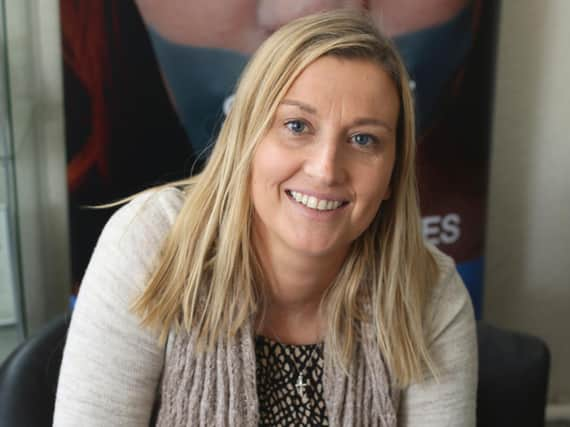Why lock-down and stockpiling could be dangerous for people with eating disorders


Worryingly, the anxiety-provoking combination of lock-down and stockpiling during the Covid-19 outbreak could be devastating for someone with an eating disorder, according to a Preston mental health nurse.
This illness involves an unhealthy attitude to food, which can take over your life. It can involve eating too much or too little, or becoming obsessed with your weight and body shape.
Advertisement
Hide AdAdvertisement
Hide AdThe most common types include anorexia nervosa, bulimia, binge eating disorder (BED) and other specified feeding or eating disorder (OSFED).


They often unhealthy coping mechanisms for dealing with distressing emotions or trauma, says Shelley Perry, clinical director and CEO of SEED, a Preston non-profit in Navigation Way that offers therapeutic support for eating disorders.
The 47-year-old, who herself struggled with the illness as a young woman, added: "It's a stressful time, and feeling out of control could fuel an eating disorder.
"People might use them as a way to gain a sense of control and order but what often comes with them are anxiety and depression, as well as immense guilt."
Advertisement
Hide AdAdvertisement
Hide AdAnorexia nervosa forms 10% of all eating disorders. This is when people try to keep their weight as low as possible by not eating enough food, exercising too much, or both.
They might attempt to restrict eating and choose not to go out and buy food during lock-down, says Shelley.
"There's always that temptation for them at the best of times," she added.
"It's problematic when they are told to stay indoors because they might think they do not need to go shopping for food.
"It could be really risky.
Advertisement
Hide AdAdvertisement
Hide Ad"And usually, they don't tell people what is going on for them. It can be a secretive disorder."
Stock-piling could also make sufferers anxious about being unable to access their "safe" food, according to the charity founder.
She added: "If there's not a lot of food left on the shelves, they might feel they don't deserve it, and that they're unimportant, which might make them feel guilty about eating."
People with obsessions about exercise might also experience heightened anxiety during this time.
Advertisement
Hide AdAdvertisement
Hide Ad"If they have nothing to do, they could be exercising all day," said Shelley.
Meanwhile, 40% of people with an eating disorder suffer from bulimia. It involves binge-eating before deliberately making yourself sick, restricting what you eat, or doing too much exercise to try to stop yourself from gaining weight.
"Often, sufferers feel like they are being controlled by their illness," said Shelley.
"It can make you feel isolated."
They might also struggle with feelings of guilt.
"That will be enormous at the moment, knowing that some people are struggling to access food while they are vomiting," she added.
But the dangers are also physical.
Advertisement
Hide AdAdvertisement
Hide AdSufferers, for example, require regular blood tests to track their potassium and phosphate levels due to chronic and prolonged dehydration caused by purging. If the former is too low and the latter too high, their heart could be affected.
But they might struggle to access such testing.
"If their heart is at risk, they could die in their sleep or have a heart attack," said Shelley.
"People with bulimia or anorexia are more susceptible to contracting coronavirus, as their immune system is suppressed because of low weight or the impact of their behaviour on their body.
"They won't be in the forefront of people's minds at the moment but they really are going to need support."
Advertisement
Hide AdAdvertisement
Hide AdThe other 50% of sufferers have either compulsive eating disorder (CED), binge eating disorder, pica or OSFED.
Pica involves eating items that are not typically thought of as food and do not contain significant nutritional value, such as hair, dirt, and paint chips.
Meanwhile, in compulsive and binge eating disorders, a person feels compelled to overeat on a regular basis.
"They make up such a high-percentage category but often people with these conditions don't get the support, recognition, care and compassion they need and deserve," said Shelley.
Advertisement
Hide AdAdvertisement
Hide Ad"We think of someone who is emaciated or doesn't eat but that's only a small percentage.
"A lot of eating disorders go unnoticed."
She added: "Someone with CED might not be able to stop thinking about food during lock-down.
"An enormous amount of guilt and low self-esteem come with it, and it's often a response to trauma."
Heavy bingeing during self-isolation could leave people feeling lethargic and depressed, Shelley says.
Advertisement
Hide AdAdvertisement
Hide Ad"And if food is being restricted because of stock-piling, that could be incredibly stressful for them," she added.
"If they can't do their compulsive behaviour, they might worry about feeling out of control."
And, commenting on the stigma that comes with the condition, she said: "These are not bad people. They are genuinely struggling with mental illness.
"If someone is seriously obese, the likelihood is that they're struggling with an eating disorder. They're trying to manage painful emotions.
Advertisement
Hide AdAdvertisement
Hide Ad"These illnesses are not lifestyle choices, which is what some people think."
What also makes them so dangerous, is the unhealthy beliefs sufferers can hold.
"They sometimes feel like their eating disorder is their best friend - something they can rely on when everything feels scary," Shelley said.
"It makes them feel temporarily better and that they can cope."
Advertisement
Hide AdAdvertisement
Hide AdAnd the catalysts of eating disorders can be complex, according to the CEO.
"There's often trauma there, and one person's trauma isn't always another's, so it's important not to judge people.
"Sometimes there's an underlying issue like Asperger's, creating the need to control things. And people with autism might also only eat specific foods.
"Sufferers often have low self-esteem and self-worth, as well as some sort of identity issue."
Advertisement
Hide AdAdvertisement
Hide AdNow, perhaps more than ever, Shelley is urging people to seek help as soon as possible and warns that we could see an influx of hospital admissions.
As she says: "You can recover. Keep in touch with people and hang in there."
How to access support during lock-down
SEED is offering paid-for therapy and counselling during the lock-down by telephone, or via Zoom, Facetime, WhatsApp and more.
Free services will run on Fridays, comprising:
- Support group, 7pm - 8-30pm;
- Live drop-in service, 1 - 3pm;
- Carers' advice and information clinic, 7pm - 8-30pm.
For more resources, visit http://www.seedlancashire.co.uk/ or beateatingdisorders.org.uk